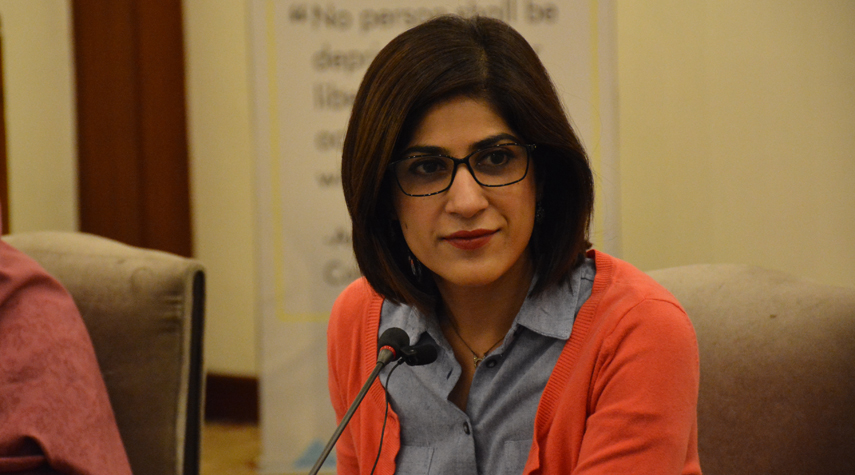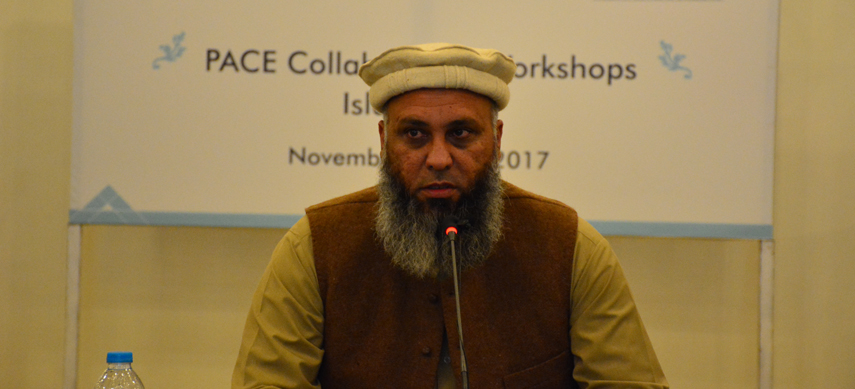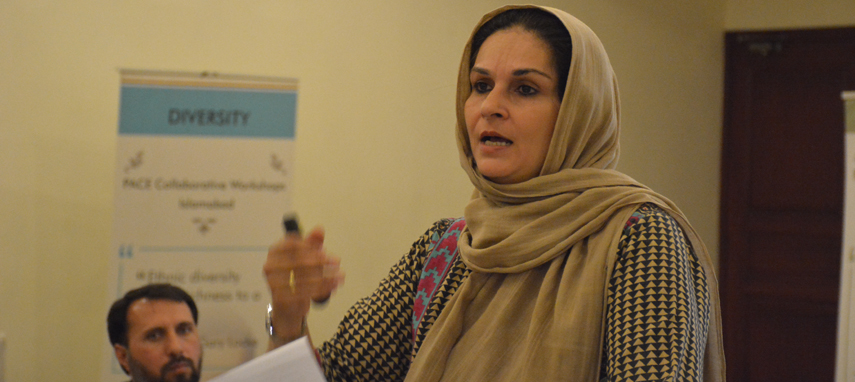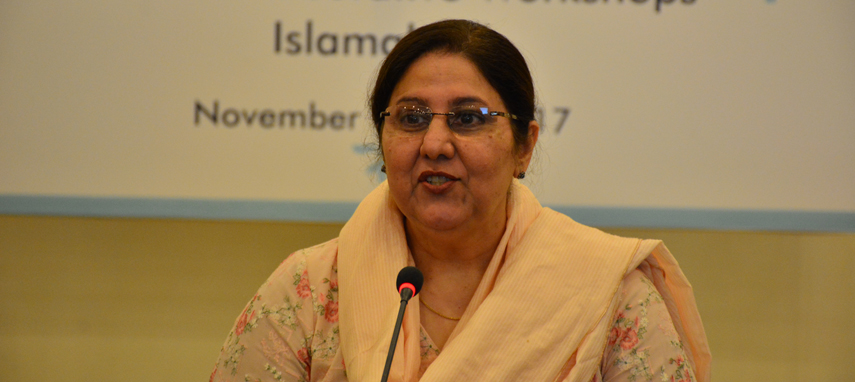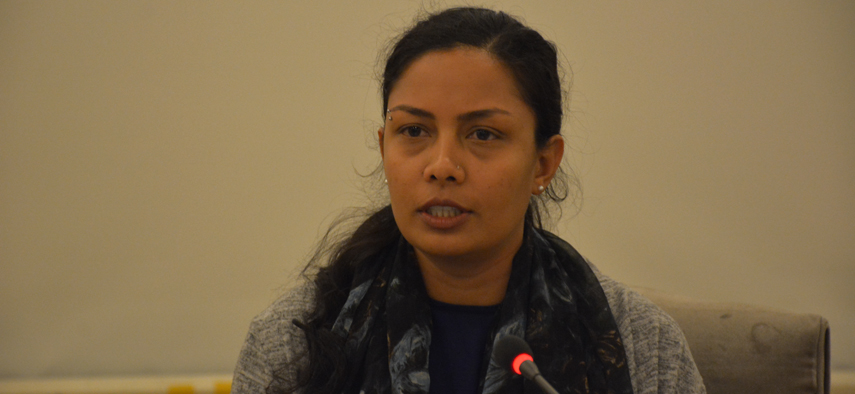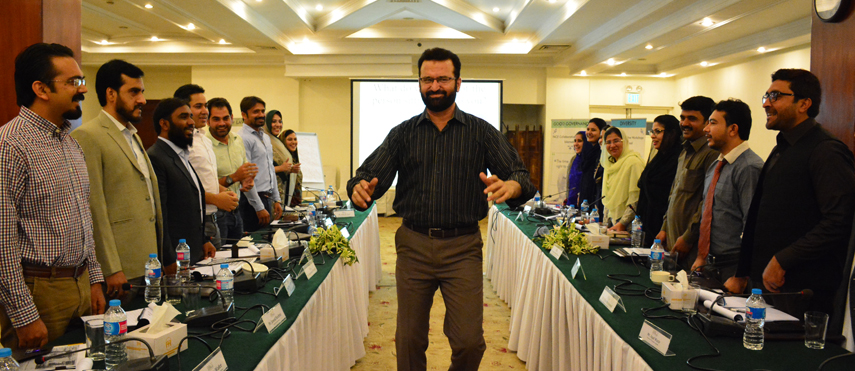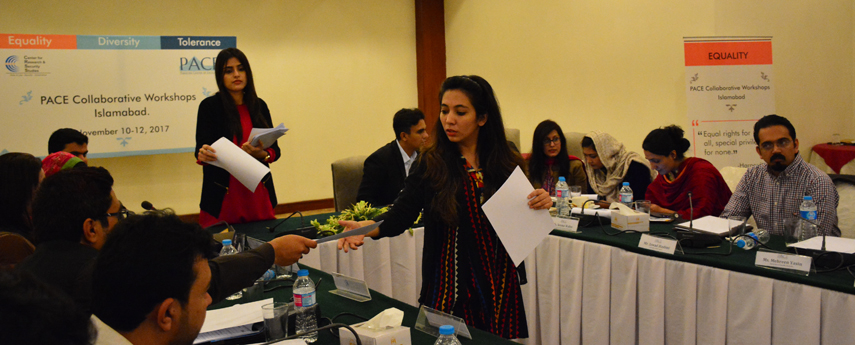The Center for Research and Security Studies (CRSS) conducted the 23rd three-day PACE Collaborative workshop for young university lecturers and professors from November 10-12, 2017, at Hill View Hotel, Islamabad. The workshop was conducted under the umbrella of the Pakistan Center of Excellence (PACE), a counter-radicalization, pluralistic values focused project, in collaboration with the Dutch Government. Participants included young university lecturers and professors from all across Pakistan including Sindh, Balochistan, Punjab, KP, AJK, FATA and GB.
OPENING
Ms. Amber Rahim Shamsi was the chief guest of the opening ceremony of 23rd round of the PACE Collaborative Workshops. Ms. Shamsi started her session with discussion on the topic of tolerance that we see it lacking in Pakistan. “Lack of tolerance is usually manifested through violence in Pakistan. What I believe is that we in Pakistan can’t progress without understanding and respecting diversity. We may apparently say that we respect other’s ideas but in practicality we do ignore them. We grow up listening to the things which develop intolerance among us. We don’t respect the difference of opinion and argue logically. Our mentality has been shaped in a way that we are not ready our preconceived notions to be challenged or even discussed. Our socialization pattern is always based on it. One of the factors responsible for this growing intolerance is ethnocentric attitude. We have lost the ability to listen to others. We only want ourselves to be heard. We need to start these from our homes and schools. Being parents we don’t initiate open discussion with our kids. In our educational institutions we should focus on developing the positive attitude in our students. We should make them learn how to argue logically and respectfully.”
Dr. Azhar Qazi: Respect for Diversity, Rights and Opinions
Dr. Azhar Qazi kicked off his session on the topic of respect for diversity, rights and opinions. He said, “Teachers are the brain of a society and I believe that teachers have the ability to bring the positivism in society. We are here to learn how to digest the concepts of diversity. We most of the time use the term respect to seek attention. We have to know the real meaning of this word to start implementing in our lives. Appearance of a person should never define his orientation. I look like a religious person but actually I’m not. I was serving in Pakistan Navy as an officer but later I joined the Afghanistan war. I was in Bagram in 2001 when America first attacked on October 8th. I never wanted to save the people who don’t opt for veil, who listen to the music, who don’t offer prayers regularly and who don’t follow the teachings of Islam. I didn’t belong to any conservative background. I believed the one who is not abiding by the teachings of Islam should be beheaded. I used to think that non-Muslims have no right to live on earth. The war period ended: I came back after experiencing the bitter realities of life. Our teaching material never tells us about the difference of opinion our ascendants have had. I, as a mujahid, observed that the commanders are being served with the most lavish food instead of the food which was given to an ordinary mujahid. VIP protocol was given to the senior commanders. It was contrary to the message that was given to us for the establishment of an Islamic state. I came back and analyzed what’s wrong with my mentality. I started realizing that this is all hypocrisy and people are playing dual games in the name of ‘Jihad’. I started analyzing the things which I didn’t find in accordance with Islam and which forced me to join the militants. My research and study brought change in my mind set and I decided to quit the so called Jihad. What I have learned from all this is that we don’t have any right to take anyone’s life on the basis of our false perceptions. Everybody has conscience to think and adopt their lives according and we have no right to interfere.”
Ms. Humaira Masihuddin: Multi-Culturalism and Pluralism With Reference To Islam
Ms. Humaira Masihuddin kicked off first formal session of the third day speaking on the theme of ‘Pluralism and Multiculturalism’. She said that human beings belong to one origin and one place, she said, and no purely homogeneous society exists in the modern world. Most societies consist of different ethnic groups. She defined minorities as a group of people who are singled out from the other groups and are treated differently because of their physical or cultural characteristics. “Minority is a subordinate group as opposed to the dominant group. The concept of multiculturalism revolves around a society with heterogeneous beliefs and set of ideas. Multiculturalism makes a society diverse. Respect for diversity shapes coexistence, peace, and harmony under a political and institutional framework. Differences are not challenges and do not impose any limitation on growth of an individual or society. Every individual has a right to be different and be respected by all. In Islam, the concept of diversity is clearly inclusive,” she continued. In the Quran, she said that humans are addressed to treat one another without any discrimination and respect each other’s beliefs and should never use abusive language or show disrespect towards others. If we look at the character of the Holy Prophet (PBUH), it is evident how He always respected the non-Muslims in Mekkah and Medina. Even on the day Mekkah was conquered by Muslims, Prophet (PBUH) forgave all His enemies for the harms that they had inflicted on Him. Ms. Humaira also made note of the last sermon of the Holy Prophet that said “All mankind is from Adam and Eve, an Arab has no superiority over a non-Arab nor a non-Arab has any superiority over an Arab; also a white has no superiority over black nor a black has any superiority over white except by piety (taqwa) and good action”. In short, Islam is the religion of tolerance and coexistence, love and peace for others regardless of their religion or ethnicity.
Ms. Naila Mir: Effective Student Handling
Ms. Naila Mir kicked off her session on the topic of “Effective Student Handling”. She started her session on discussing the myths and realities regarding teaching methodologies in the context of Pakistan. She shared, “You don’t need any inborn talent to become great at something. Talent can be developed and for that you need the motivation and practice. Learning through a different method may reduce effort and time and make students understand the message. A teacher should give feedback and help students identify own areas and adopt for a positive approach to overcome the weaknesses. You can help them speed up their learning tenfold by helping them identify and use the right methods.”
Ms. Radha Shah: Addressing and Recognizing Sexism: Global and Pakistani Context
Ms. Radha Shah started her session on “Addressing and Recognizing Sexism in Global and Pakistani Context”. She shared her experience saying that the session would specifically focus on the issue of sexism at workplace when women are harassed sexually as well as don’t have equal access to speak or participate. Sexism even when you are not being heard on the basis of your gender and how can it affect your possibility for contribution and function in a professional capacity. It also means that if women are facing particular barriers at the workplace they are also excluded from the broader ideas of diversity. A lot of organizations in Pakistan and around the world make talks in terms of inclusivity and diversity but what actually happens is that women are in constant marathon to keep up with their male colleagues.
“We need to look into the practical solutions for women where experience is more bearable and also productive. At the same time what are the things that men can do to actively create more equality for women at workplace if they are very much into this idea of diversity and equality,” she said.
She said, “My experience is from Canada and now in Pakistan, where I faced sexism that was also combined with racism. A colored person’s experience is way different from a white person facing sexism. One major difference that I noticed prior to coming to Pakistan that I never talked about sexism and feminism as much as I had here and it wasn’t expected. I find from my conversations with my social circle and professionals that women have to fight through every day and women are also tired of experiencing discrimination at work place. We need to encourage discussion on gender equality and more on women inclusion in mainstream.”
A woman, in Pakistan, is supposed be careful while making decisions for herself. Women can’t wear dresses of their choice, their participation and contribution at work place is not as appreciated as men, they are thought of lacking inter-personal skills, their capability and credibility is being misjudged on the basis of their gender. A women’s experience has very much to do with their gender.
Laws like Anti-Harassment Act, 2010 were passed and such laws are the starting point for change. Despite the fact, we have a law, still there are lots of gaps and women face harassment. At the organizational level, HR and admin departments should make sexual harassment laws and protect women from assault or other discriminator or abusive behaviors. People need to be educated about equal rights for all and also need to bring such issues in the notice of policy makers to get away with these crucial issues.
Mr. Safiullah Gul: Motivation and Leadership
Mr. Safiullah Gul was the last speaker of the workshop and spoke on the topic of ‘Leadership and Motivation’. He began with the saying that “he who fails to plan actually plans to fail” and shared stories of people who alone have changed the course of history, with motivation and persistence, despite all the opposition.
He said that successful leadership determines the extent of efforts directed towards a certain goal. He presented his model of goal-seeking i.e. activation, persistence and intensity. “Being alone doesn’t actually matter if you have goals and objectives set in your mind. To achieve these goals, you actually need to overcome your fears and insecurities. An individual sometimes can set an example and be motivation for others,” he shared.
The session, filled with activities to enhance creative and critical thinking, focused on looking at things from a slightly different perspective to encourage problem-solving.
CLOSING
Ms. Farhana Kanwal, Project Coordinator, PACE, in her concluding remarks, insisted that there is a dire need to revisit the widespread preconceived notions that have been passed through cultural values in the society over generations. Teachers, with the responsibility of imparting values to the young generation in educational institutions, are the most valuable engines that can challenge common negative narratives that promote hatred and bigotry. She said that teachers have the ability to shape an entire generation’s mindset to propagate tolerance, diversity and equality.
Ms. Zehra Zaidi, Project Coordinator, shared that participants need to conduct these activities with their students to inculcate adherence to the rule of law and equal citizenry. CRSS provides financial and logistic support in this regard to lecturers and professors so that they can foster the universal ideals of tolerance and diversity in the young generations.

